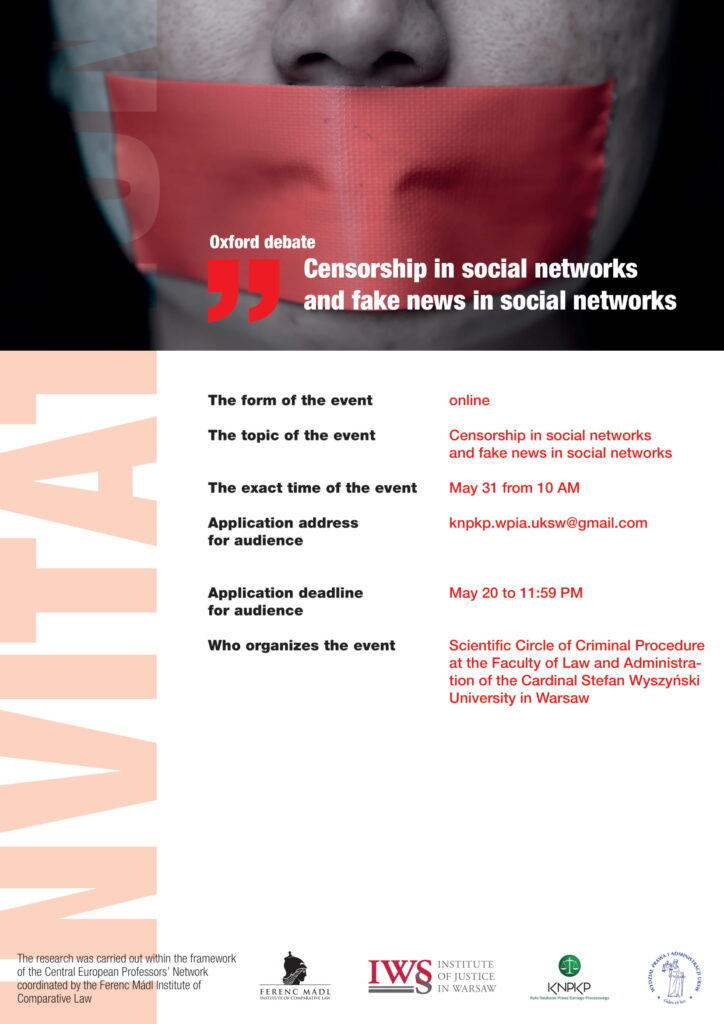The Oxford debate entitled ” Censorship in Social Networks and Fake News in Social Networks” was held on May 31, 2021, from 10 a.m. to 1 p.m., by means of remote communication.
The event was organized by the Institute of Justice, Ferenc Mádl Institute of Comparative Law, Central European Comparative Law Association and the Scientific Circle of Criminal Procedure of the Cardinal Stefan Wyszyński University in Warsaw.
The Oxford Debate was organized within the framework of the Central European Professors’ Network 2021.
Two teams: Polish and Hungarian took part in the event.
The event started with an official welcome to the guests and participants of the Debate by the Director of the Justice Institute, Dr hab. Marcin Wielec, Head of the research group “The impact of digital platforms and social media on freedom of expression and pluralism” in Central European Professors’ Network 2021, Tutor of the Scientific Circle of Criminal Procedure of the Faculty of Law and Administration of the Cardinal Stefan Wyszyński University and the Director of the Ferenc Mádl Institute of Comparative Law (hereafter: FMI), Prof. Ede Janos Szilagyi.
The Coordinator of the Centre for Strategic Analysis of the Institute of Justice, Bartłomiej Oręziak, also took the floor and ceremonially welcomed the guests and participants. In his speech, he explained the rules of the Oxford Debate.
The moderator of the event, Maria Fróg- Pilch, took the floor, introduced the Hungarian and Polish teams, and started the debate.
The teams of the participants in the debate were as follows:
TEAM FROM HUNGARY:
– Prof. Dr. János Ede Szilágyi – Team Coach.
Full professor and the Head of Department of Agricultural and Labour Law at the University of Miskolc. Since 2019, he has been the Head of the Ferenc Mádl Institute of Comparative Law. He is editor-in-chief of the journals titled ’Journal of Agricultural and Environmental Law’ and ’Central European Journal of Comparative Law’. He is a member of the Board of Directors of European Public Law Organization, the Hungarian Deputy Delegate of the Management Board of Comité Européen de Droit Rural, a member of the Editorial Board of Legal Issues in Transdisciplinary Environmental Studies (Springer), Law in Action (Prawo w Działaniu), and Hungarian Yearbook of International Law and European Law. He is a member of the Scientific Committee of CEDR Journal of Rural Law, The Legal Culture (Kultura Prawna).
– Álmos Ungvári – PhD candidate at the Doctoral School of Law and Political Sciences of the Pázmány Péter Catholic University in Budapest, Hungary.
– Laszlo Dornfeld – PhD candidate at the Ferenc Deak Doctoral School of Law at Miskolc University, Hungary. He is currently employed as a researcher at the Ferenc Mádl Institute of Comparative Law, Department of Public Law in Budapest.
– Bálint Kovács – LL.M., is a PhD candidate at the Marton Géza Doctoral School of Legal Studies at Debrecen University, Hungary.
– János Színek – LL.M. is a PhD candidate at the Ferenc Deák Doctoral School of Law at the University of Miskolc, Hungary.
TEAM FROM POLAND:
– Dr. hab. Marcin Wielec – Team Coach
Director of the Institute of Justice. Full professor and the Head of the the Department of Criminal Procedure at the Cardinal Stefan Wyszyński University in Warsaw. A graduate of the MBA – Top Public Executive program at the Bosiness School University of Navarra in Barcelona and the National School of Public Administration Lech Kaczyński in Warsaw. A member of the Program – Scientific Council of the quarterly “Probacja”. Member of the Scientific Council of the Institute of Judicial Expertism Professor J. Sehna in Krakow, a member of the Program Council of the Scientific Scriptures “Central European Journal of Comparative Law”, issued by the Institute for Comparative Law. Ferenca Mádla in Budapest.
– Roland Szymczykiewicz – attorney, specialist in penal law. He runs his on law firm in Warsaw. He’s also an academic teacher at UKSW in Warsaw (University named by Cardinal Stephen Wyszyński) on Law Faculty (subject: polish penal procedure).
– Ewa Płocha – attorney, an assistant at the Department of Criminal Procedure at the Institute of Legal Sciences at the Faculty of Law and Administration at the University of Cardinal Stefan Wyszyński in Warsaw.
– Klaudia Łuniewska – polish lawyer. A graduate of law at the Faculty of Law and Administration of the Cardinal Stefan Wyszyński University in Warsaw.
– Dr Marcin Rau – an assistant professor at the Department of Criminal Procedure at the Cardinal Stefan Wyszyński University in Warsaw and also a former visiting scholar at the Italian and German universities.
The debate consisted of two thematic parts:
PART I: ‘Legal aspects of content censorship in social networks’.
PART II: ‘Fake News as an important factor of influence of digital platforms and social networks on guarantees of freedom of speech and truthfulness of information in Poland/Hungary’
The first part of the Debate addressed issues such as:
- “Content censorship on social networks in Poland; Legal bases of censorship in Poland; Relevant international standards in Poland”, which was presented by Klaudia Łuniewska from Polish Team, as well as “Content censorship on social networks in Hungary; Legal bases of censorship in Hungary; Relevant international standards in Hungary”, which was presented by Álmos Ungvári from the Hungarian Team.
- “Entities Deciding About Content Censorship in Poland; Criteria for content censorship in Poland”, which was presented by Ewa Płocha from Polish Team, as well as “Entities Deciding About Content Censorship in Hungary; Criteria for content censorship in Hungary”, which was presented by László Dornfeld from the Hungarian Team.
- “Censorship procedure in Poland; Procedure for pursuing claims in court in Poland”, which was presented by Roland Szymczykiewicz from Polish Team, as well as “Censorship procedure in Hungary; Procedure for pursuing claims in court in Hungary”, which was presented by János Szinek from the Hungarian Team.
- “The impact of censoring content on social networks on the freedom of expression in Poland; The impact of censorship of content on social networks on pluralism in Poland; Summary.”, which was presented by Marcin Rau from Polish Team, as well as “The impact of censoring content on social networks on the freedom of expression in Hungary; The impact of censorship of content on social networks on pluralism in Hungary; Summary”, which was presented by Bálint Kovács from the Hungarian Team.
The second part of the Debate addressed issues such as:
- “Review of legal regulations on the basis of which the functioning of digital platforms and social media in a given country is allowed (organizational form, representation in a given country, legal obligations, operating restrictions, etc.) in Poland; The concept of fake news in Poland; Fake news classification in Poland”, which was presented by Roland Szymczykiewicz from the Polish Team, as well as “Review of legal regulations on the basis of which the functioning of digital platforms and social media in a given country is allowed (organizational form, representation in a given country, legal obligations, operating restrictions, etc.) in Hungary; The concept of fake news in Hungary; Fake news classification in Hungary”, which was presented by János Szinek from the Hungarian
- “Fake news and deep news – differences and similarities in Poland; The role and importance of creating, disseminating and using fake news in Poland”, which was presented by Marcin Rau from Polish Team, as well as “Fake news and deep news – differences and similarities in Hungary; The role and importance of creating, disseminating and using fake news in Hungary”, which was presented by Bálint Kovács from the Hungarian Team.
- “Liability for the creation, dissemination and use of fake news (criminal liability) in Poland; Liability for the creation, dissemination and use of fake news (civil liability) in Poland”, which was presented by Ewa Płocha from the Polish Team, as well as “Liability for the creation, dissemination and use of fake news (criminal liability) in Hungary; Liability for the creation, dissemination and use of fake news (civil liability) in Hungary”, which was presented by László Dornfeld from the Hungarian Team.
- “The impact of fake news on the freedom of expression in Poland; The impact of fake news on pluralism in Poland; Summary”, which was presented by Klaudia Łuniewska from the Polish Team, as well as “The impact of fake news on the freedom of expression in Hungary; The impact of fake news on pluralism in Hungary; Summary”, which was presented by Álmos Ungvári from the Hungarian Team.
A characteristic feature of the Oxford Debate was to draw attention to the benefits and risks of the progressive digitization of the modern world.
During the event, many real-life situations that humanity had to deal with were recalled. De lege ferenda postulates were presented. A wide spectrum of threats connected with the discussed subject matter was presented (e.g. manipulation, blackmail of natural persons, legal persons; negative influence on such areas as public safety, public order, public health and morality, freedoms and rights of other persons).
Finally, it was pointed out that the basic and most important measure of prevention is education of people in the discussed range.


